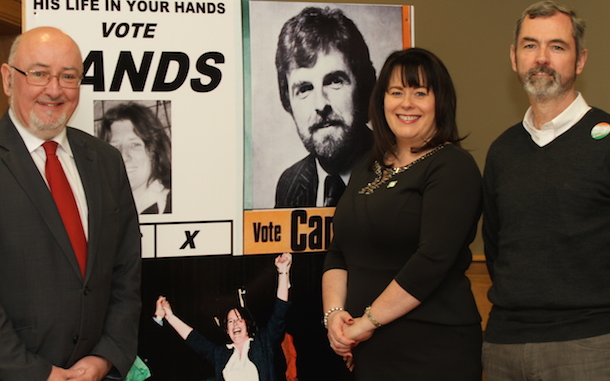10 April 2015
Choice between equality and austerity is central to Westminster election campaign
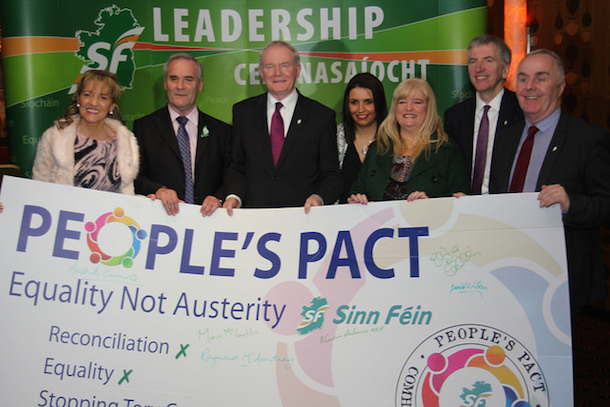
THE Westminster general election is now fully under way in Britain and the Six Counties. Many polls continue to suggest that the next British parliament may be ‘hung’, with the Tories and Labour taking approximately one third of the vote each and the last third being carved out among all other competing parties in England, Wales, Scotland and the North. That includes UKIP and the DUP, the Welsh nationalist Plaid Cymru, the Scottish National Party and Sinn Féin.
Focus on the political economy and how and why the economy and economic policies should function are centre stage.
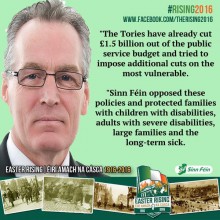
The Tories have declared that, if re-elected, their plan for reducing the British state’s deficit next time would include an additional £30billion in cutbacks, £12billion of which will come from welfare. They have refused to say what specific new welfare cuts would be implemented. However, given their ideological attack on the welfare state to date, this inevitably means that the disabled, children with special needs and in poverty, the long-term sick, elderly, and care assistants will be targeted.
The ramifications of the Tories’ new plans will be catastrophic.
The British welfare state has already been seriously damaged. There are over 700,000 citizens on zero hours contracts.
The Tories are also committed to a referendum on withdrawal from Europe and this will have its own repercussions.
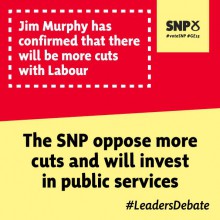
Last month, British Labour Party Shadow Finance Minister Ed Balls admitted his own support for austerity policies, albeit on a smaller scale than the Tories. That signals a future Labour administration has already been compromised by an acceptance of austerity.
So it was significant to hear the trenchant rejection by Scottish National Party leader Nicola Sturgeon of austerity during the last fortnight at her party’s spring conference and then on the TV leaders’ debates.
The SNP and Sinn Féin are now the only significant parties in the British state or Ireland giving leadership on anti-austerity politics, and alternative economic and fiscal strategies.
Significantly, the SNP may become the third or fourth largest party in the British parliament after this election.
An unambiguous commitment to equality sets Sinn Féin apart from every other party contesting this election in the North.
All of the unionist parties, including Alliance, have been compromised by the acceptance of austerity. This is why the impasse over implementing the actual agreement on welfare protections remains extant within the Executive.
Ultimately, responsibility rests with the British Government. The political institutions were established to deliver change in the North as it emerged from conflict. Yet the Tories made a decision five years ago to reduce the public expenditure settlement (the block grant), for the Six Counties to support that work by £1.5billion.
Now the Tories have made it clear that they will make even bigger cuts to the block grant, given the chance. That prospect contains very serious economic and social implications for Northern society. The precise intentions of a Labour government are unclear.
When asked about the unionist electoral pact during his visit to Belfast last Tuesday, Tory British Prime Minister David Cameron refused to comment. He had no need. The Tories are standing 16 candidates in the North. They will not contest Fermanagh & South Tyrone or North Belfast. That is an attempt to support the DUP’s Nigel Dodds against Sinn Féin’s surge and to assist the Ulster Unionist Tom Elliot’s challenge against Michelle Gildernew.
Of course, the Tories have been courting the DUP in particular for some time now. Their focus is on a ‘hung’ parliament and planning for “confidence and supply” arrangements with both UKIP and the DUP.
Ideologically, the DUP and UUP have already bought into the austerity agenda. Their wider electoral pact is a negative, sectarian, and pro-austerity alliance now supported by Cameron’s Tory party. It offers nothing to the unionist working poor, jobless and most deprived, or indeed any section of Northern society.
Simply put, unionism in this election is a byword for no political vision and bad economics – and a proxy to enable even worse Tory austerity in the North.
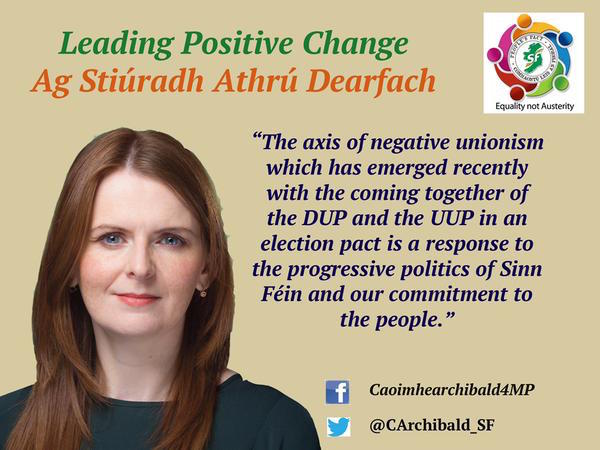
The alternative to the unionist/Tory ‘race to the bottom’ is the type of vision, leadership, and strategy which rejects austerity, supports equality, and is committed to building the alliances across society to bring that about.
That should be the focus of all genuinely progressive parties and organisations in the coming weeks.
Follow us on Facebook
An Phoblacht on Twitter
Uncomfortable Conversations

An initiative for dialogue
for reconciliation
— — — — — — —
Contributions from key figures in the churches, academia and wider civic society as well as senior republican figures




